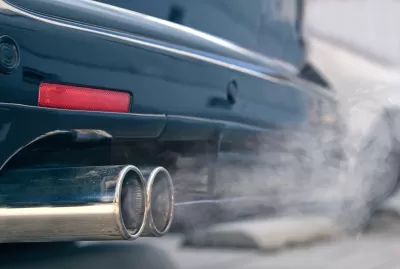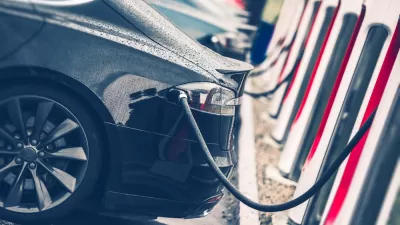Colorado residents can get $6,000 in extra rebates if they trade in their old gas-powered vehicle for an electric vehicle. Rebates are expected to go quickly.

Colorado is launching a “cash-for-clunkers” program, with $1.8 million to pay residents in exchange for their old, polluting, gas-powered cars. The rebates are expected to go fast.
“Those participating in Vehicle Exchange Colorado must apply the $6,000 toward a qualifying new or leased electric vehicle or plug-in hybrid electric vehicle, or take $4,000 off a used EV,” reports Michael Booth.
“Colorado Energy Office program manager Ed Piersa said the state expects the exchange program to last for years and ramp up financing if it proves popular,” adds Both.
The source article, linked below, also includes background on the program. According to the article, the program is an attempt at making the electric car market more equitable. “Colorado has pledged to get 940,000 EVs on state roads by 2030, and has also launched various rules and programs to promote environmental justice and economic equity along the way,” writes Booth. A zero emissions vehicle standard approved by the state in 2019 also requires automakers to sell more EVs in the state.
Cash-for-clunkers is a phrase immediately recognizable to anyone who lived through the Great Recession and the corresponding auto industry bailout. In 2023, however, the state of Colorado’s cash-for-clunkers program makes electric vehicles, rather than more fuel efficient or hybrid vehicles, more affordable for program participants.
FULL STORY: Colorado revives “cash for clunkers,” offers $6,000 for an old car you trade for an EV

Maui's Vacation Rental Debate Turns Ugly
Verbal attacks, misinformation campaigns and fistfights plague a high-stakes debate to convert thousands of vacation rentals into long-term housing.

Planetizen Federal Action Tracker
A weekly monitor of how Trump’s orders and actions are impacting planners and planning in America.

In Urban Planning, AI Prompting Could be the New Design Thinking
Creativity has long been key to great urban design. What if we see AI as our new creative partner?

King County Supportive Housing Program Offers Hope for Unhoused Residents
The county is taking a ‘Housing First’ approach that prioritizes getting people into housing, then offering wraparound supportive services.

Researchers Use AI to Get Clearer Picture of US Housing
Analysts are using artificial intelligence to supercharge their research by allowing them to comb through data faster. Though these AI tools can be error prone, they save time and housing researchers are optimistic about the future.

Making Shared Micromobility More Inclusive
Cities and shared mobility system operators can do more to include people with disabilities in planning and operations, per a new report.
Urban Design for Planners 1: Software Tools
This six-course series explores essential urban design concepts using open source software and equips planners with the tools they need to participate fully in the urban design process.
Planning for Universal Design
Learn the tools for implementing Universal Design in planning regulations.
planning NEXT
Appalachian Highlands Housing Partners
Mpact (founded as Rail~Volution)
City of Camden Redevelopment Agency
City of Astoria
City of Portland
City of Laramie





























